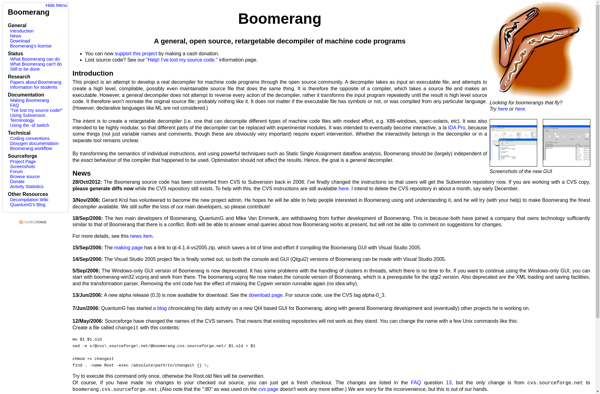Boomerang decompiler

Boomerang Decompiler: Open Source Reverse Engineering Tool
Reverse engineer executable files into higher level source code with Boomerang decompiler, an open source tool supporting C, C++, Objective-C, and Java binaries.
What is Boomerang decompiler?
Boomerang decompiler is an advanced, open source decompiler for compiled programs. It can take an executable file generated by a compiler and attempt to transform it back into the original source code that built it.
Boomerang supports decompilation of programs written in C, C++, Objective-C, and Java programming languages. It utilizes program analysis and advanced algorithms to reverse the compilation process, regenerate high level constructs such as functions, loops, classes, etc. and generate human-readable source code.
Developers can utilize Boomerang to understand the internal logic of third party closed-source applications, reuse code snippets from proprietary software, audit binaries for security vulnerabilities, or adapt old compiled software that has lost its source code. It generates output in C/C++ languages.
Some key capabilities include:
- Decompilation of x86, ARM, PowerPC, Sparc, and MIPS platforms
- Supports exe, elf, cof and other formats
- Advanced control and data flow analysis algorithms
- Regeneration of high level code constructs
- Output in C/C++ programming languages
- CLI and GUI interface for ease of use
Boomerang started in 1999 at The University of Queensland, Australia and has seen over 20 years of continued development and research. It generates high accuracy decompiled code and has an active open source community behind it.
Boomerang decompiler Features
Features
- Decompiles machine code back to C/C++ source code
- Supports decompilation of Windows, Linux, macOS, and mobile executable files
- Can extract key symbols, strings, constants, and control flow constructs from binaries
- Integrates with IDA Pro disassembler
- Command line and GUI versions available
Pricing
- Open Source
Pros
Cons
Official Links
Reviews & Ratings
Login to ReviewThe Best Boomerang decompiler Alternatives
Top Development and Reverse Engineering and other similar apps like Boomerang decompiler
Here are some alternatives to Boomerang decompiler:
Suggest an alternative ❐Immunity Debugger

WinDbg
